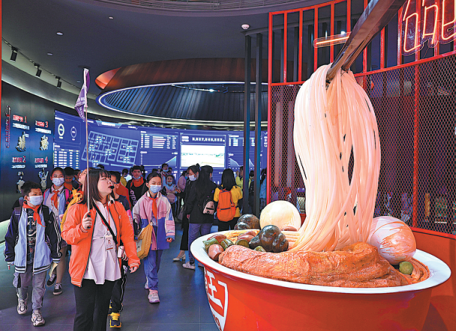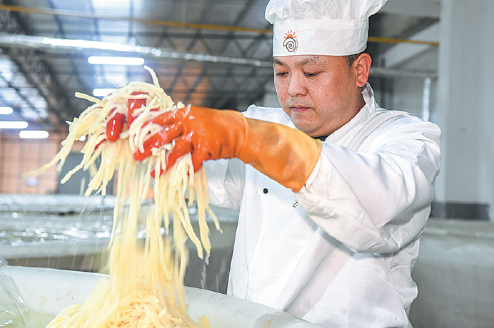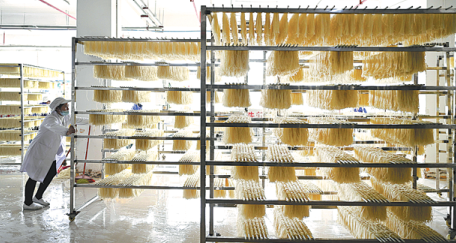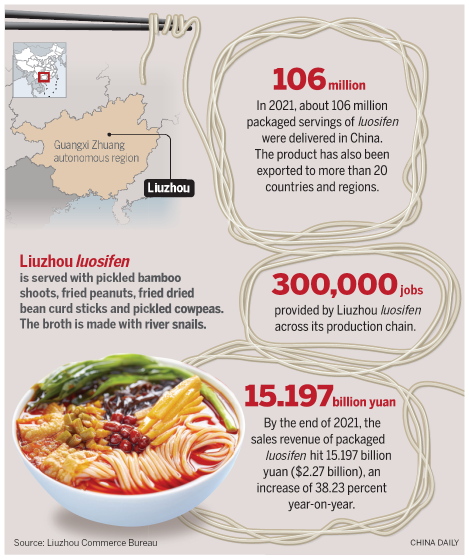Humble street snack rides fresh wave of popularity
Editor's note: This series of stories looks at local enterprises in specialized sectors that have a share in global markets.
Luosifen, which translates as river snail rice noodles, has risen from its humble roots as a street snack in Southwest China to take the nation's food scene and beyond by storm, with spikes in domestic as well as overseas sales.
Amid the COVID-19 pandemic, the precooked, packaged version of the product has seen record production and sales, according to industry figures.
Luosifen, which can be traced to Liuzhou, a city in the Guangxi Zhuang autonomous region, features rice noodles soaked in a spicy broth flavored with river snails and topped with pickled bamboo shoots, which give it a distinctive, tangy aroma.
By the end of last year, sales revenue of packaged luosifen hit 15.197 billion yuan ($2.27 billion), an increase of 38.23 percent year-on-year, with the production and sales of many companies in the sector doubling, according to Jia Jiangong, deputy director of Liuzhou's commerce bureau.
Major producers such as Guangxi Luobawang Food Technology pointed to the widespread development of the "homebound economy" during the pandemic, by leveraging online sales and logistics channels. This helped fuel spikes in domestic and overseas orders for precooked, packaged versions of the dish.
"Our daily production capacity was only about 80,000 to 100,000 packs two decades ago. By 2021, we reached 500,000 packs a day after a new plant was put into production, with a fourfold increase of overall production capacity compared with Chen Bo, general manager of Guangxi Luobawang Food Technology.
Chen Sheng, chairman of Guangxi Shanyuan Food, said, "In April last year, we sold 150,000 to 200,000 packs a day, and now it is stable at about 350,000 packs."
Along with technological and production facility upgrades, the company has set up at least nine sales branches across the country, and links have been formed with major supermarket chains.
The explosive growth helped the company reap sales of nearly 670 million yuan last year, Chen Sheng said, adding that the enterprise aims to break the 1 billion yuan mark this year.
Special labels
At least 56 companies in Liuzhou have been certified to use geographical indication labels as part of the increasing importance placed on protecting and promoting the luosifen economy, which has created more than 300,000 jobs, according to industry reports. Geographical indication labels indicate that a product has a specific geographical origin and possesses qualities or a reputation due to that origin.
Liuzhou exported 806.6 metric tons of luosifen packaged noodles from January to April this year-double that of the same period last year, according to Liuzhou customs. In 2021, exports of the product hit a record 52.56 million yuan-an increase of about 80 percent year-on-year, according to customs figures.
In addition to traditional export markets such as the United States, Australia and some European countries, shipments of the ready-to-serve food were also sent to Singapore and New Zealand.
Many local farmers have also lifted themselves out of poverty through production of the rice noodles and other ingredients used in the product.
At the Lyubao vegetable farming cooperative in Dongquan township in the county of Liucheng, visitors are treated to the tangy aromas of bamboo shoots and other pickled ingredients wafting from large jars that are tended by bustling workers.
The community sells about 19,000 kilograms of cowpeas and bamboo shoots a day, bringing sales of more than 90,000 yuan, which adds to the incomes of more than 30 villagers and has lifted at least 23 people out of poverty, said Su Baoguang, the cooperative's chairman.
With the cooperative outgrowing its 5,000-square-meter production site, an investment group has decided to jointly fund an enterprise to provide a new facility, which is scheduled for completion next year, said Zhou Zhi, Party secretary of Dongquan township.
The village has a 10-hectare snail-breeding base, which can produce 185,000kg of snails a year, mostly used to supply the local luosifen sector, and brings in more than 1 million yuan in revenue, Zhou said.
The village's residents also stand to benefit further from convenient transportation links for the industry, Zhou said.
Similarly, in Liyong township of Liuzhou's Yufeng district, construction of a luosifen raw materials production site, which will cover nearly 13.3 hectares, is underway.
Hu Fan, Party secretary of Liyong, said that the site can harvest 1,500 kg of bamboo shoots and 1,250 kg of wild peppers from each farm plot.
"This year we cultivated 400,000 bamboo shoot seedlings and all were sold," Hu said.
Huang Yanzhi invested in a luosifen raw materials processing plant six years ago in Yufeng district.
"I didn't expect the sector to develop so quickly. Our products have been in short supply," he said.
Last year, the factory produced more than 6 million kg of pickled bamboo shoots and cowpeas, involving more than 666 hectares of bamboo shoot farmland and more than 266 hectares used for beans, all of which has helped local farmers increase their income.
"Last year, the scale of the city's luosifen raw materials base was about 36,800 hectares, an increase of 10.4 percent over the previous year," said Qin Yanmei, deputy director of Liuzhou's agriculture and rural affairs bureau. The city also has plans for at least 20 demonstration bases, totaling more than 1,500 hectares, for luosifen raw materials production.
Liuzhou's farming sites for luosifen are expanding in tandem with investments in automation and other technology for the pillar industry.
At Guangxi Meiji Food Technology in Liuzhou's Xinxing Industrial Park, three fully automated and two semi-automated luosifen production lines have helped the company double its capacity to 300,000 packs a day, overcoming what Mo Qinji, the company's chairman, said were manpower constraints in packaging the products.
"In the early days of the epidemic, the 'homebound economy' brought a surge in sales of packaged luosifen, but insufficient workers made it impossible to meet the demand for orders, with waiting time stretching nearly 50 days," Mo said.
Mo studied automation and worked in a construction machinery company in the city, and this experience and expertise helped him develop machinery and equipment for luosifen production.
It took one-and-a-half years, investments of more than 3 million yuan, and six rounds of improvement before he came up with the company's first fully automated production line, which was rolled out in early June last year, he said.
Efficiency improved
"The automated production line also reduced the original 15 workers needed on a production line to two people, greatly improving efficiency, saving labor and redirecting resources," Mo said.
"Many of our automation research and development team members come from large enterprises in Liuzhou. If it weren't for Liuzhou's good industrial foundation, this would definitely not be possible," he added.
The noodle dish continues to be major calling card for Liuzhou, coming a long way from its street snack origins in the 1970s. In a nod to the importance of luosifen to Liuzhou extending beyond its economy to cover the social and cultural spheres, the dish has also been included on the latest national intangible cultural heritage list, further increasing its popularity at home and abroad.
Adeleye Martins Adedamola, a student at the International College of Guangxi University of Science and Technology in Liuzhou, is among foreign fans of luosifen.
"I'm really addicted to the tasty Liuzhou river snails rice noodles," said Adedamola, a dual citizen of Nigeria and the United States.
"I'd order two marinated eggs, some duck kidney slices, vegetables and deep-fried bean curd as toppings for the noodles."
Ken Fletcher, a Briton who works at the Liuzhou Foreign Affairs Office, said: "When I found out about this dish, I was surprised. All foreigners seem to like it. It's very popular."
"I also have friends from other parts of Guangxi, not just Liuzhou. Some are living in America or Australia and I believe they will really be happy if they can buy packaged luosifen to make."
Li Bin contributed to this story.
Contact the writers at alexishooi@chinadaily.com.cn



















